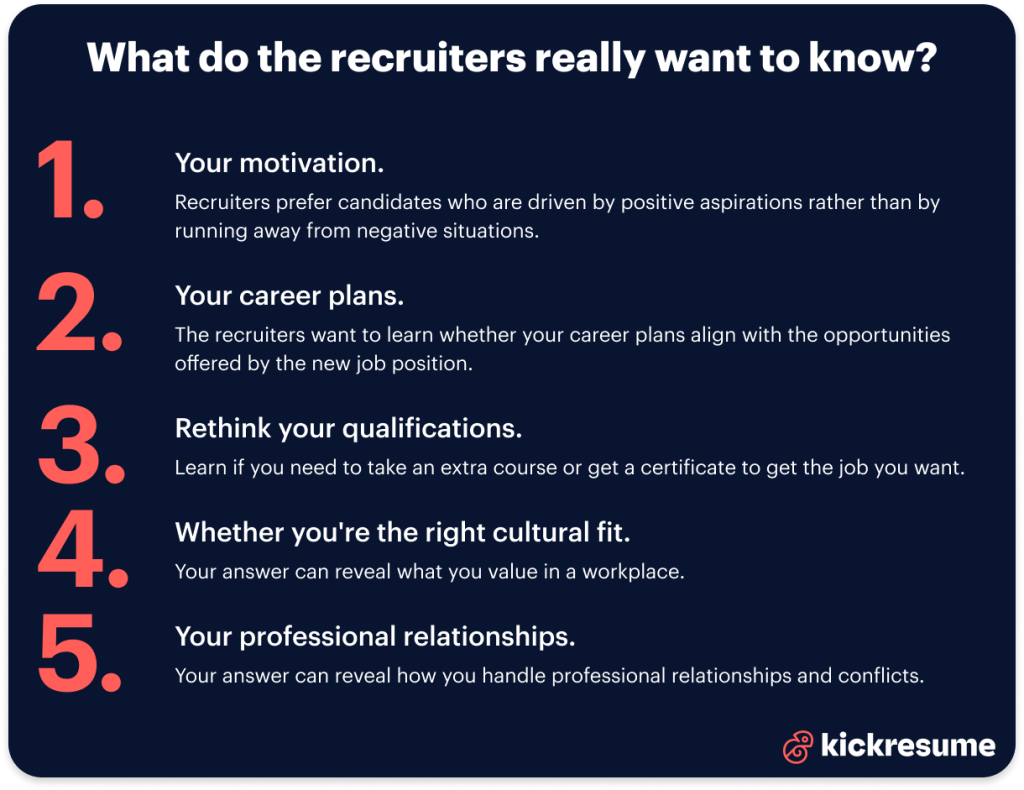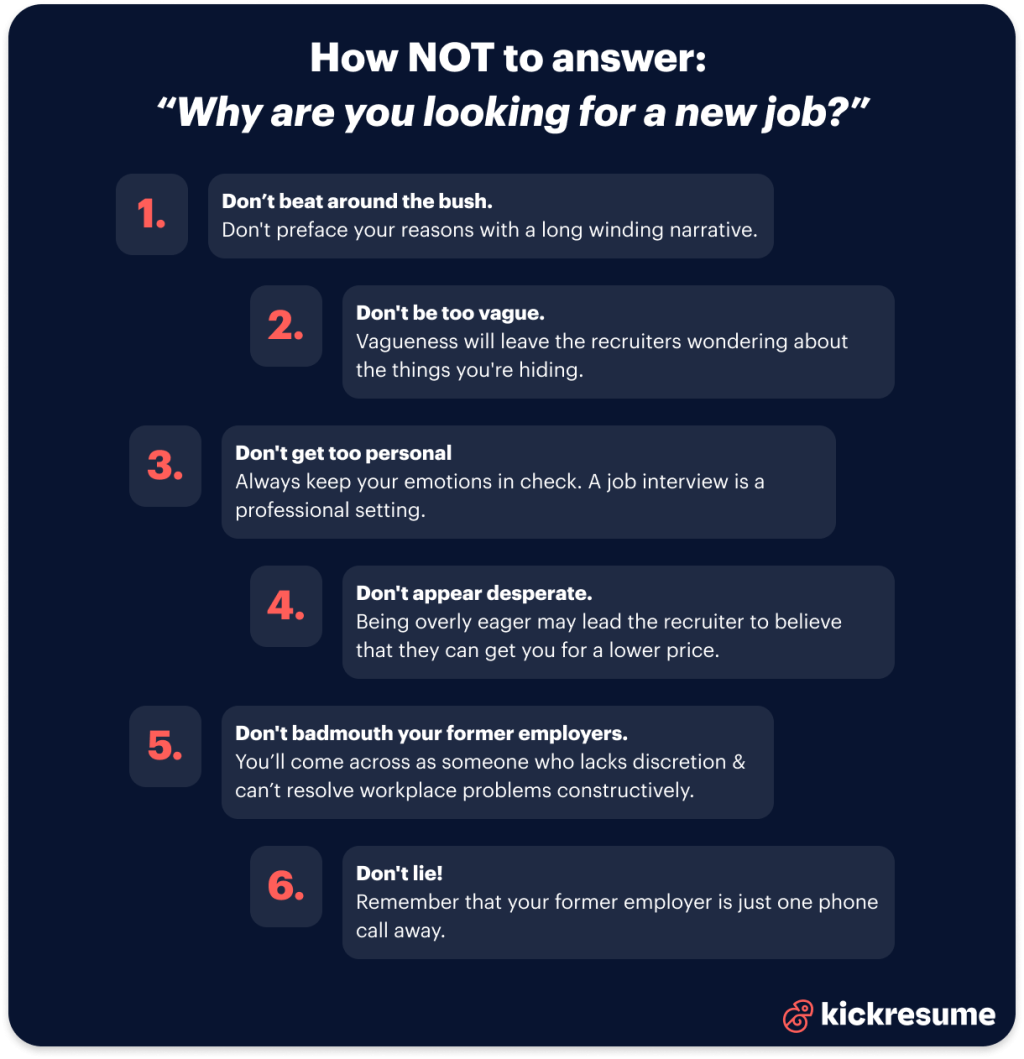Awkward silence fills the room as you're wondering how to answer “Why are you looking for a new job?”.
Instead of being panicky and nervous, consider this question an opportunity to take the reins of the job interview into your own hands!
How you frame your answer can significantly impact the interviewer's perception of you as a candidate.
To avoid creating an uncomfortable situation, you must think carefully about what you decide to share with the recruiters and what to omit.
If you want to ace your job interview, read this article and find out:
- What do the recruiters really want to know;
- What you should avoid saying;
- How to answer the question “Why are you looking for a new job?”;
- And sample answers.
Without further ado, let's begin!
- What do the recruiters really want to know?
- How NOT to answer "Why are you looking for a new job?"
- How to answer the question “Why are you looking for a new job?”
- Sample answers: “Why are you looking for a new job?”
- #1 When you were fired from your previous job.
- #2 When you left a toxic workplace.
- #3 When you've been unemployed for several months.
- #4 When you've spent less than a year in your previous job.
- #5 When you want a higher salary.
- Key takeaways: How to answer "Why are you looking for a new job"
What do the recruiters really want to know?
As you might've already suspected, there's more to this question than meets the eye.
Regardless of your response, recruiters can learn many things about you as a professional:
- Your motivation. The recruiters want to know what pushes you forward. Why are you interested in working for them? Additionally, recruiters look for candidates who are driven by positive aspirations (such as seeking new challenges) rather than those who run away from negative situations.
- Your career plans. Another information the recruiters want to learn is whether your career plans align with the opportunities offered by the new job. If, for example, your professional goal is to work on international projects, but the company you're applying for operates strictly within its domestic market, it would be a waste of your time to continue with the application process.
- Whether you're the right cultural fit. Understanding your reasons for leaving your current job can give recruiters insight into what kind of work environment is the most conducive for you. In other words, your answer can reveal what you value in a workplace.
- Your professional relationships. Lastly, the recruiters want to probe how good of a team player you are. Companies, especially corporate ones, function as one big organism. Hence, interactions with other people are inevitable. Your answer can reveal how you handle professional relationships and conflicts.

How NOT to answer "Why are you looking for a new job?"
Before discussing the best strategy to use, let's look at the things you should never do when answering “Why are you looking for a new job?”.
In this case, trying to formulate a good answer is like dancing through a minefield.
If you want to get to the other side with grace and in one piece, avoid these common pitfalls:
- Don't beat around the bush. A direct question requires a direct answer. Don't preface your reasons with a long winding narrative. And don't dance around the subject either. Keep it short and sweet.
- Don't be vague. Sometimes, in the name of politeness, we use vagueness to mask uncomfortable truths. Not here! Vagueness will leave the recruiters wondering about the things you're hiding. If you won't communicate your reasons clearly, they'll connect the dots in their mind – and this may not be in your favour.
- Don't get too personal. Always keep your emotions in check. A job interview is a professional setting. Displaying strong emotions may raise concerns about your ability to maintain composure during trying moments. Similarly, leave out mentions of any petty conflicts you might've had with your previous colleagues.
- Don't appear desperate. While showing enthusiasm for the new role is certainly desired, don't overdo it. Being overly eager may lead the recruiter to believe that they can get you for a lower price. Or, they may think that nobody else wants to hire you. And, this, in turn, will leave them wondering what is wrong with you.
- Don't badmouth your former employers. Trash talking about your former employer, or your former team, is a HUGE red flag! You can come across as someone who lacks discretion or the ability to resolve workplace problems constructively.
- Don't lie! All information can be checked. Remember that your former employer is just one phone call away.

How to answer the question “Why are you looking for a new job?”
The concrete answer, of course, always depends on the circumstances and your situation.
However, there are a few talking points which can be applied in almost all cases:
- Excitement about the new company and the opportunities it provides. Focus on how the new position offers the opportunity for further development your current job cannot provide. Highlight specific aspects of the role (or the company) that you're particularly drawn to.
- Your career goals. Once again, this topic is a great opportunity to show your thoughtfulness about your career. Present your career objectives and align them with the objectives of the new company. Tell the recruiters how this move fits into your long-term professional plans.
- Your past achievements and acquired skills. Sneak in a few of the most valuable transferable skills you've picked up in your past job. Also, mention any successful projects you partook in. Then, connect these to the responsibilities pertaining to the job position you're applying for.
- Show that you are the right cultural fit. This point requires a bit of research. Go through the company's webpage, LinkedIn, or social media. What is the company's mission? What projects did they participate in? What awards have they gained? Use this information to your advantage.
In short, make sure to align your skills, experience, and career goals as closely as possible to the needs and philosophy of the company you wish to join.
We'll get into the specific sample answers in the next chapter.
Sample answers: “Why are you looking for a new job?”
Fail to prepare – prepare to fail!
Now, let's look at 5 possible reasons/situations why you might want to enter a new employment
- You were fired from your previous job.
- You left a toxic workplace.
- You've been unemployed for several months.
- You've spent less than a year in your previous job.
- You want a higher salary.
And this is how you communicate why you're looking for a new job in these situations without sounding arrogant, too eager or otherwise unfit for the role:
#1 When you were fired from your previous job.
Your latest employment didn't end on a high? We understand your nervousness.
After all, being let go or considered redundant are not exactly the attributes of the perfect candidate.
However, with the right framing, you can turn your answer into a show of your resilience, professionalism, and positive approach to your future career steps.
DON'T
- Don't lie about the fact that you were fired. There is nothing more embarrassing than denying this fact, only to have the recruiters contact your former employer and learn the truth of the matter from them!
- Don't play the blame game. Don't try to put the responsibility of your failure on others, or on your circumstance. Acknowledge your mistakes. The recruiters are more likely to appreciate a candidate with self-awareness than a candidate who lacks accountability.
- Don't talk ill of your former employer. We've already emphasized why this is not a good idea. Any disparaging comments may, in the end, negatively reflect on your professional reputation.
DO
- Keep your answer honest and brief. While it's true that honesty is the best policy, you don't have to go into much detail about the circumstances of your exit from the company.
- Focus on the positive side. After a quick explanation, shift the focus of your answer to what you've learned from the experience and how it helped you prepare for your next role. Mention any skills or projects that can depict you in the best light.
- Spotlight your resilience and room for growth. Show them how redundancy made you more resilient and adaptable. For example: “The experience taught me a lot about the importance of clear communication and aligning with my team's goals. I've taken those lessons to heart, and I'm excited about the opportunity to apply them in a new setting.“
- Express enthusiasm for the new opportunities. Lastly, you have to convince the recruiters that your interest in their company derives from positive reasons. Show them your passion for contributing to particular projects or teams.
If you've been let go from your previous job, your answer to "Why are you looking for a new job" may look like this:
#1 Sample answer
#2 When you left a toxic workplace.
Just like with your family members, you simply can't pick your colleagues.
Whether you've had a horrible boss, or miserable management, you still have to keep your answer classy and resist the temptation to blast your former toxic workplace.
Yes, we know it's tempting. Here's what to do and what to avoid in this situation:
DON'T
- Don't badmouth your previous workplace. Criticizing your previous employers (even if they fully deserve it) can make the recruiters question your loyalty. Can you really be trusted? Will you speak negatively about them as well? Or worse, what if you are the problem? Are you difficult to work with? Are you even able to resolve conflicts in a mature, professional way?
DO
- Instead of blasting your previous job, praise the company you wish to join. You can highlight their past achievements as the reasons why you want to work for them. This will show your genuine interest in their work and projects. Moreover, this strategy is also an opportunity to show yourself as a conscientious person – it shows that your decision to change employers was motivated by positive impulses.
If this is your case, you can answer like so:
#2 Sample answer
#3 When you've been unemployed for several months.
If there's a gap anywhere in your resume, you can bet that the recruiters will bring it up.
So make sure you're prepared for this eventuality!
When asked "Why are you looking for a new job" in case you've been unemployed for a longer period of time:
DON'T
- Don't bring it up unless they do. The golden rule is – don't answer the question you haven't been asked. Maybe you've managed to hide it well on your resume. Or maybe, this gap happened a long time ago and the recruiters simply don't care. In any case, don't bring their attention to it.
- Don't try to hide it or lie about it. But when they do bring it up, don’t lie! There's no shame in taking some time off. On the contrary, it can be extremely beneficial.
DO
- Prove them that you weren't being lazy. In your answer, make sure to mention any courses, certificates or volunteering you've taken on. Show that you've spent this time proactively. Lastly, demonstrate how you can utilize these new skills in their company.
A good way to navigate this situation when you're asked "Why are you looking for a new job" can look like this:
#3 Sample answer
#4 When you've spent less than a year in your previous job.
Even though it might've seemed like an eternity to you, spending less than a year in one employment is considered short-term.
This may bring the recruiters to question your ability to make a serious commitment to a workplace, and your tendency to flee when things get hard.
DON'T
- Don't shy away from it. It's right there on your resume, and it's obvious. Recruiters want to employ candidates who are loyal and willing to stay for as long as possible (or until fired). While job-hopping can bring you diverse experience and skills, some conservative companies still frown upon it.
- Don't speak ill of your former workplace. Just as we've said before, this never ends well. Refrain from any negative comments.
DO
- Address the elephant in the room. Acknowledge the fact that your former work experience was brief right from the get go. After all, the recruiters are ready to ask it, one-up them and bring it forth first. Show them your awareness and professionalism.
- Express your desire for a long-term commitment. This might reassure them of your intentions.
Hence, in case you've just been asked "Why are you looking for a new job" after you've spent less than a year in your previous job, say this:
#4 Sample answer
#5 When you want a higher salary.
Yes, money is important. We know it. You know it. The recruiters know it.
Yet, talking about financial rewards is a taboo topic.
DON'T
- Don't bring it up. Unless it's that part of the job interview where the recruiters themselves introduce the topic. Employers don't want to hear that your primary motivation for working in their company is solely material.
DO
- Focus on highlighting your skills. Remember, the question isn't Why did you leave your previous job, but rather "Why are you looking for a new job". So, in your answer, convince the interviewer you're a great fit.
- You can get personal here. If you want to deliver a truly impactful answer, you have to look for the reasons why you are looking for a new job beyond mere financial gain. Don't be afraid to also give personal reasons alongside the professional ones. Maybe you've already touched upon them in your cover letter. If so, dust them off and remind the recruiters of your passion.
For example, imagine how a job interview could go for an interior designer with a keen interest in plants in indoor spaces:
#5 Sample answer
Key takeaways: How to answer "Why are you looking for a new job"
Generally speaking, recruiters want to know more about:
- your motivation;
- your career plans;
- whether you're the right cultural fit;
- and if you're able to maintain positive professional relationships.
Accordingly, your answers should reassure them of your aspirations, reliability and suitability for the particular job position.
To navigate this question successfully, avoid the following:
- being vague;
- being too personal;
- appearing desperate;
- straight up lying;
- or being negative about past employers.
Instead, focus your response on your achievements, skills, desire for new challenges, and how these align with the new company's opportunities.
Here are some follow-up interview questions that may come up:



